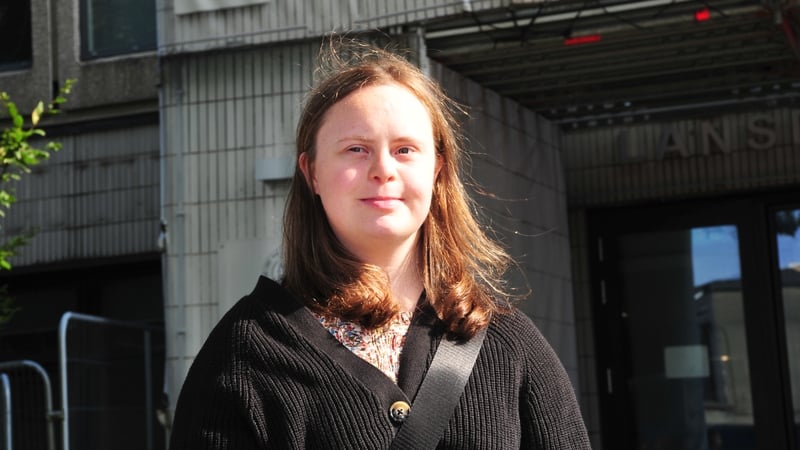Almost a third of students at the National College of Art and Design have self-declared additional needs of some description, a senior administrator has told an equality tribunal.
The witness told the Workplace Relations Commission (WRC) that the college made “every effort” to support a young artist with Down Syndrome pursuing a degree – but that it could not “wipe the slate clean” after she failed a crucial first-year module.
NCAD’s director also gave evidence today that in the wake of a “heated” meeting with the student’s parents, the woman’s mother, a journalist, told her “they would make sure that my reputation was damaged”.
The student, Ellie Dunne, (25) – who is said by her legal team to be the first ever student with Down Syndrome to enrol on a degree programme at NCAD on Thomas Street in Dublin 8 – is pursuing a complaint under the Equal Status Act 2000 against the college.
Her case is that the college failed to provide her with reasonable accommodation during her first semester after starting in September 2023 and that disability discrimination continued when the college required her to re-sit a failed first-year module.
The college’s lawyers have denied discrimination “in the strongest possible terms”.
At the Workplace Relations Commission this week, the college’s head of academic affairs, Dr Siún Hanrahan, said some 32% of the college’s approximately 1,400 students had self-declared additional needs of some description.
She said art, as a discipline, is “able to accommodate a range of ways of thinking” and that the college was able to offer “tailored” support packages, on foot of a needs assessment, to students presenting evidence of a disability.
“Less tailored” support was available more broadly to those who had simply self-declared additional needs, Dr Hanrahan said – including counselling, time management, grammar supports and language supports.
Dr Hanrahan said there was a “significant difference” between the requirements of the Level 5 course in art completed by Ms Dunne at Stillorgan College of Further Education and the Level 8 bachelor’s degree at NCAD.
Ms Dunne had access to assistive technology and an educational support worker who was available for two days a week, the tribunal heard. After Ms Dunne failed a module, the college made the support worker available for five days of the week, the tribunal was told.
The witness said Ms Dunne’s parents, Katy McGuinness and Feidhlim Dunne, took it as “a very offensive thing that Ellie had not successfully achieved the learning outcomes of the module”.
“[Their] view was that the slate should be wiped clean,” she said. “Under the [academic] regulations, that’s just not possible… we cannot wipe the slate clean, we cannot,” the witness added.

The tribunal heard the college proposed to allow Ms Dunne re-sit the assessment with access to workshops and without academic penalty, and to have it considered by an exam board the following autumn.
Rosemary Mallon BL, for the respondent instructed by Paul McDonald of AJP McDonald Solicitors, pointed out that she had asked Ms Dunne in cross-examination last year whether she “knew about that offer”.
“She indicated that she did not know about that offer and she would have liked to avail of it. Did you tell her that offer was there, or was all communication with her parents,” she asked Dr Hanrahan.
“In my role, I would not have been speaking with Ellie,” Ms Hanrahan confirmed.
“If Ellie didn’t know, it was because she was not told by her parents?” Ms Mallon said. “Yes,” Dr Hanrahan said.
The college’s director, Professor Sarah Glennie, said there was an “impasse” at a January 2024 meeting between herself, Dr Hanrahan and Ms Dunne’s parents, whom she said asked repeatedly that NCAD “wipe the slate clean”, while the college officials tried “to explain why we couldn’t do that”, Professor Glennie said.
Professor Glennie said University College Dublin would be “within [its] rights to remove our ability to award these degrees, or any degrees” if she was to do as she was being asked. She described the meeting as “heated” and “agitated”.
“Any suggestion of a repeat was met with a lot of opposition,” Professor Glennie said, but she added that mediation was agreed to by the family.
During a phone call two days later, Professor Glennie said that Ms McGuinness referred to media interest in her daughter’s progress at NCAD – and to the prospect of “bad publicity for the college”.
“I said that our concern was not the PR, but working with them to find a solution. Ms McGuinness said she was aware this wasn’t my fault, that I was being let down by people in the college, and she was aware that I was someone who was respected in the art world,” she said.
Ms McGuinness went on to say “they would make sure that my reputation was damaged” and that “they would bury me in the process,” Prof Glennie said.
“That was directly said, that they would ‘bury you’ in the process?” adjudicator Breiffni O’Neill asked. Professor Glennie confirmed this.
In cross examination, counsel for the complainant Aisling Mulligan BL, appearing instructed by KOD Lyons, put it to the witness that Ms McGuinness had “disputed” telling Professor Glennie she “would be buried”.
Professor Glennie said: “That is my recollection.”
When the disputed remark was first raised last year by Ms Mallon, Ms McGuinness said it was “a phrase not familiar to me”.
The case has been adjourned to a further series of hearings in October.
Ms Mulligan put it to Dr Hanrahan yesterday that Ms Dunne had gone on to pass a later assignment with a C+ grade when her NCAD-provided support worker’s hours were increased.
She suggested this showed NCAD had failed to provide reasonable accommodation earlier in the term.
“The provision of two days with the support worker was perfectly reasonable in light of the information given to us. The family left the whole section blank,” Dr Hanrahan replied.
“As soon as it became clear that further support might be required” NCAD had “adjusted the accommodations to the maximum”, she added.
Last November, Ms Dunne gave evidence and said of NCAD: “I’m angry with them because they’re failing to support me.”
Ms McGuinness said her family’s relationship with the college “broke down” when they saw a document on disability supports which they contend bears their daughter’s “forged” signature.
The tribunal heard that a breach in protocol by an assistant psychologist on secondment to NCAD from the National Learning Network – who cannot be named in the press by direction of the WRC – led to some 160 NCAD students having their disability support needs assessments reviewed in Ms Dunne’s first term.
The tribunal has heard Ms Dunne’s name was typed into the document without consent, with the adjudicator noting at the time that it wasn’t a “classic forgery”.




